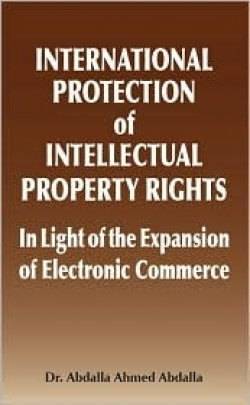It looks like you've stumbled upon a page meant to be read by our code instead of viewed directly. You're probably looking for this page.
International Protection of Intellectual Property Rights In Light of the Expansion of Electronic Commerce
The Internet has created nothing short of a global re-definition of the management of intellectual property rights (IPR). Information can be created, copied, and disseminated electronically with ease. Protection of trademarks becomes particularly challenging when domain names incorporating brand names can be purchased without restriction. The process of patenting electronic commerce-related inventions and even methods of doing business has met with controversy and has yet to be standardized.
Given these varied and complex issues, *International Protection of Intellectual Property Rights In Light of the Expansion of Electronic Commerce—*which is actually author Abdalla Ahmed Abdalla’s doctorate thesis—is a much-needed exploration of IPR inasmuch as it applies to electronic commerce. Abdalla methodically lays out a comprehensive discussion that includes intellectual property law, modern-day intellectual property rights, the impact of the Internet on IPR, regulation of electronic commerce, copyright and trademark protection on digital networks, patenting with regard to electronic commerce, and the movement toward “internationally harmonized” IPR.
A few sections of the book are quite basic. A chapter about the Internet, for example, covers everything from definitions of such fundamentals as “email,” “browser,” “HTML,” and “domain name” to how the Internet works. Similarly, the initial chapter tracing the history of intellectual property law is largely background information. However, these chapters are useful in that they provide the necessary foundation for the subsequent material.
The book’s chapter on “conflict of laws” is intriguing because it considers the fact that international law is no longer bound by physical space. In fact, writes the author, “the Internet has not only weakened the significance of physical locations, but destroyed them all together in three senses…” This raises the issue of whether a traditional court even has jurisdiction to settle a dispute that occurs in the electronic world.
In his discussion on trademarks, as on international law, Abdalla explains that the Internet brings a new complexity to trademark law because “once a trademark is put on the World Wide Web it can be seen in every place reached by the Internet. Thus, a trademark owner may find himself involved in disputes in foreign jurisdictions where his rights are not recognized.”
Abdalla’s concluding chapter is a summary of the book’s key points and serves to highlight the complexities of intellectual property rights in a digital world. The author proposes a number of recommendations to reform the international intellectual property system, most of which will ultimately require a governing body such as the United Nations to get involved.
Given the topic, it is no surprise that this book is somewhat dry and academic. It is at the same time a valuable, well-documented presentation of a topic that couldn’t be more timely or relevant.
Reviewed by
Barry Silverstein
Disclosure: This article is not an endorsement, but a review. The publisher of this book provided free copies of the book and paid a small fee to have their book reviewed by a professional reviewer. Foreword Reviews and Clarion Reviews make no guarantee that the publisher will receive a positive review. Foreword Magazine, Inc. is disclosing this in accordance with the Federal Trade Commission’s 16 CFR, Part 255.
